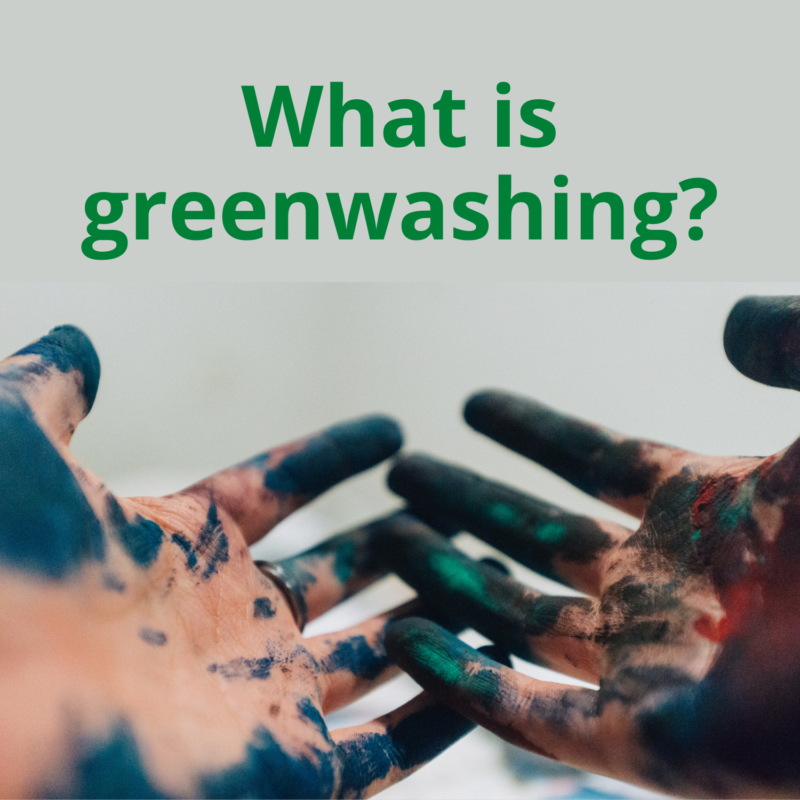Greenwashing is a deceptive marketing technique that companies use to make people believe they’re doing more to protect the environment than they really are.
Consumers have become more environmentally-conscious. There is now a huge demand for products that are natural, sustainable, and, earth-friendly. And brands and major retailers have caught onto this trend.
By falsely marketing their products as ethical and sustainable (aka greenwashing) companies are fooling customers into believing their purchase will have a positive impact on the planet.

Greenwashing Techniques
One of the most subliminal ways brands fool you is by using green packaging. Often there will be images of trees and flowers to make you believe the product inside is environmentally-friendly.
Brands guilty of greenwashing
Brands focus on one green aspect and brush over the rest of their not-so-green practices. For example, they may boast about their fully recyclable packaging but ignore the single-use product inside. And they can also exaggerate how eco-friendly they are, making themselves out to be bigger deal than they truly are.
They use buzzwords such as ‘organic’ ‘ethical’ and ‘eco-friendly.’ However, these terms carry no legal weight so companies can self-declare they’re ethical, even if they aren’t.
H&M – In 2012, H&M launched their green line of ‘Conscious’ clothing. Clothes are supposedly from made sustainably sourced materials and methods. Great, right?! Yet, the company glossed over an important fact. The vast majority of their other collections are made from unsustainable sources that use toxic chemicals and destroy the earth’s resources.
McDonalds – In 2018, this fast-food chain ditched their plastic straws for paper straws. Despite the straws being ‘100% recyclable,’ the cups themselves aren’t recyclable. And because straws aren’t being separately recycled, they are just thrown away with the cups. This is a form of greenwashing; switching to paper straws has no real significant benefit other than to make the company look good.
Fiji water- Marketed as pure, natural, and untouched by man, Fiji water is a prime example of greenwashing. In fact, in 2011 the company was sued for greenwashing. They claimed they were ‘carbon negative’ when in reality, their carbon footprint is huge: their plastic bottles are from China, their water is from a Fijian aquifer and their products are shipped to 60 international countries.

How to spot greenwashing
Greenwashing isn’t immediately obvious. You’ll have to dig a little deeper to find out whether or not a product lives up to its claims.
- Look at the packaging first. Does it use natural imagery or buzzwords to make you believe its eco-friendly?
- Don’t be fooled by claims or sweeping statements. Companies can self-declare that their product is ethical. Look for evidence to back it up.
- Avoid ambiguity! Genuinely ethical companies are very transparent about their way of working.
- Always check the ingredients list.
- Look for industry-standard certifications. These include Fair Trade, Vegan Society, and Organic Content Standards.
- If in doubt- reach out! Contact companies to make sure they are who they say they are.
Once you know the signs of greenwashing you won’t be so easily fooled.
Greenwashing is a deceptive marketing technique that makes companies appear that they’re doing more for the environment than they are. Brands are exploiting the demand for earth-friendly products and capitalizing on customer’s desire to make a positive impact on the planet.
Companies can mislead, exaggerate, and make big claims about how green they are. Through natural imagery and buzzwords, they subtly fool you into thinking their products are ethical. Raising awareness about greenwashing and calling companies out is a step in the right direction. Hopefully they will rise to the demand for genuinely green products.

